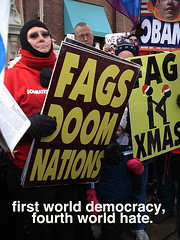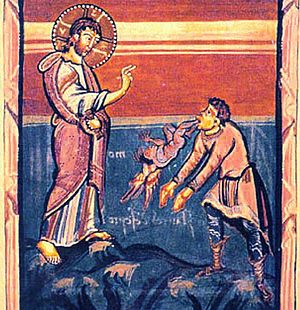Wounded listeners
It must have been pure coincidence that, over the past days, my attention was twice drawn to the effect our words (as priests) have on those who hear them. The first of the two instances refers to the recent report by the Public Religion Research Institute on “
Catholic Attitudes on Gay and Lesbian Issues.” One of the most relevant results was, in my opinion, that regarding the influence of priests’ preaching on youth suicide. More precisely the report finds that:
Seven‐in‐ten (70%) Catholics say that messages from America’s places of worship contribute a lot (33%) or a little (37%) to higher rates of suicide among gay and lesbian youth. (page 12 of the report)
The second eye-opener came from a book I recently picked up to read, Donald Cozzens’ The Changing Face of the Priesthood. Cozzens speaks about the value of the ministry of the Word, but also highlights the responsibility that comes with this ministry. In particular he raises the issue of words that wound, and gives a number of very relevant examples:
It is the clerical word that enforces without listening carefully to parishioners’ circumstances. It is the word that puts the image and policies of the institutional Church ahead of the pastoral well-being of the people of God. Sometimes it is a true word, a gospel word, spoken too soon or at the wrong time, giving the listener reason to believe that the priest knows only how to name sin and disgrace without searching for the movement of grace that often stirs in the most deplorable of situations. Ecclesial words are at their worst when they become words of inquisition and accusation. The Inquisition, it can be argued, still exists though stripped of physical torture and the stake. It exists wherever an inquisitor takes the verbal formulations of the truths of our tradition and understands them as timeless absolutes whose meaning has once and for all been declared and confirmed. It exists whenever the essential truths of our faith are understood in such a manner that historical and contextual realities are dismissed out of hand. (page 93)
Truth, Freedom ... and Healing
Over the last years, I have been less and less exposed to other priests’ homilies (though I do get feedback from their listeners!) so, perhaps, I have been spared the worst. Being conscious (as a gay man) what it means to be stigmatised, I have tried to ensure that the general themes in my homilies match much of what I write here in QTC. To this end, I felt that it was important to write in previous posts about truth and freedom. And I thought that should have been enough. However, upon reflection, I realise that there is a third factor that needs to be mentioned to complete the story. And this third factor is – healing, or if you would like to look at it by the end result – wholeness (holiness). I don’t think I’m revealing anything by saying that wholeness and holiness really mean the same thing. What may not immediately register in the mind is the connection that there is between freedom, truth and wholeness/holiness. Healing makes the connection clearer. It’s not enough to talk about freedom, as if this is a hurdle that is overcome once and for all. We are free to the extent that we are whole. And conversely, to the extent that our brokenness continues to be part of our present, then we lack something of the total freedom that comes with being whole/holy.
The Lord tells Moses and the people of Israel:
I am the Lord, who makes you holy. (Exodus 31:13b)
And this vision of holiness runs through the length of scripture to the NT, with Jesus telling the man healed of leprosy:
“Rise and go; your faith has made you well.” (Luke 17:19 “whole” in the KJV/AV)
The writer of the book of Hebrews further states that:
By one sacrifice he [Jesus] has made perfect forever those who are being made holy. (10:14)
Looking at it this way, holiness/wholeness becomes a vision, something to own as well as to aim for. And yes, as queers we are also called to wholeness.
Whether we are conscious of it or not, the process of coming out (even when factoring in possible setbacks) is an act of grace, a healing act as well as a freeing act. The truth of self-acceptance of one’s sexual identity and orientation unleashes a wave of change. As a gay man, I could witness to the strengthening of my identity in Christ through this act of coming out: it is Jesus himself who beckoned me to come out of the grave and into the light. What seemed less clear at that point, but subsequently became not only clearer but demanded my attention was the fact that coming out and breaking free was not the end of the journey towards wholeness/holiness. Quite the contrary was true. Now, the pursuit of wholeness became an imperative. What other options are there? The easy way out would be to continue to nurse my wounds and go into victim mode, sliding into a state of helplessness. That just will not do.
The narrative of the Gerasene demoniac
I was particularly inspired – from the multitude of healing narratives in Scripture – by the story of the Gerasene demoniac (Mark 5:1-20), especially after I read James Alison’s reading on this in his book Faith beyond resentment (in chapter 6).
When they came to Jesus, they saw the man who had been possessed by the legion of demons, sitting there, dressed and in his right mind; and they were afraid. (verse 15)
The sight of a man who had formerly been labelled as possessed sitting beside Jesus, dressed and in his right mind must have been quite a shock. Hardly surprising therefore is the reaction of fear. And yet, we need to consider what this man’s previous condition had been. He was a person stripped of all human dignity, cast out of society because of his ‘demons’, and found shelter only among the dead (the gravestones). Such was the pain and suffering of this person (he would cry out) that he even acted out in a self-destructive manner (cutting himself with stones) – thereby further confirming that he was possessed by demons. Society couldn’t control him (they tried to chain his hands and feet), so they dispossessed themselves of him – he was simply known as the demoniac. Not one of them, he represented all that they felt they were not.
As gay persons we may have experienced this dehumanisation and demonisation in a myriad forms: the demon of homosexuality; reparative therapy; a pathology to be cured of; abnormal behaviour that is condemned by society; being cast out by family, friends and society; the homophobia both external and internalised; labels such as “intrinsic evil” and “objectively disordered” don’t leave much to the imagination, do they? In a large number of cases the resulting woundedness is so severe that there seems to be no end to the pain and suffering – self-destructive behaviour and death seem to be the only ways to end the pain. The gospel author reveals the man’s intense agony by exposing what happens when this destructive energy is transferred to the pigs; no sooner they were invaded by the demonising power the herd hurtled into the sea.
Jesus entered the scene to bring peace to the man, reinstating his humanity. The movement from woundedness to wholeness is completed by the final action of Jesus:
“Go home to your family and tell them how much the Lord has done for you, and how he has had mercy on you.” (verse 19)
What could be more subversive than returning to the place of former rejection to witness God’s grace, love and healing. The man is given the role of an apostle. He does not need to play by the community’s rules any longer (us vs. the demoniac). At peace with himself (the action of sitting) and no longer tortured by the words and actions of the community that kept him in chains (he is now described as being in his right mind) he is restored in his dignity as a human being (dressed). Beside him stood Jesus, source and ultimate guarantor of the new place and status of this man.
Returning whole
As queer folk we are invited to let this vision of wholeness become ours too. Yes, there will probably be an outpouring of anger, and a painful giving up of the false sense of being that we had received by society and church in order to belong without belonging (conditional belonging). It may be hard at first to realise the freedom and healing that comes from not having to play by a set of rules aimed at confirming the ‘demon’ in us. There is healing in being able to go back to the community and society and demand equality of treatment. Wholeness is achieved when we are not condemned a priori for the love that we are capable of giving, but rather when we are allowed to explore ways in which we learn and grow by loving. And finally, wholeness is ours when we listen to Jesus choosing us to return to society and church to show the wonderful work that has been done in us. Possessed by God's Spirit allows us to repossess ourselves, owning our humanity to the full.
Suggested reading:





